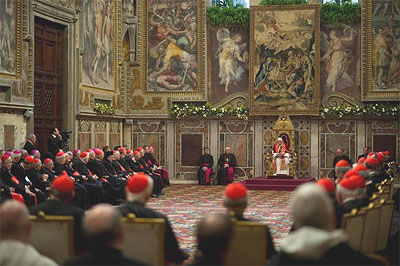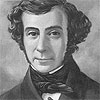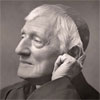
- Excita, Domine, potentiam tuam, et veni. ["Awaken your power, Lord, and come"] - Pope Benedict calls to mind the Advent prayer, "probably formulated as the Roman Empire was in decline" and is parallel in contemporary times:
The disintegration of the key principles of law and of the fundamental moral attitudes underpinning them burst open the dams which until that time had protected peaceful coexistence among peoples. The sun was setting over an entire world. ...
For all its new hopes and possibilities, our world is at the same time troubled by the sense that moral consensus is collapsing, consensus without which juridical and political structures cannot function. Consequently the forces mobilized for the defence of such structures seem doomed to failure.
- Benedict turns to one of the "great tribulations" plaguing the Church in the past year:
... when in this year of all years [The Year for Priests] and to a degree we could not have imagined, we came to know of abuse of minors committed by priests who twist the sacrament into its antithesis, and under the mantle of the sacred profoundly wound human persons in their childhood, damaging them for a whole lifetime.
 The scandal of clergy abuse calls to Benedict's mind Saint Hildegard of Bingen's vision of the Church - "a woman of such beauty that the human mind is unable to comprehend", face shining "with exceeding brightness" and gaze fixed on heaven -- but also "stained with dust, her robe was ripped down the right side, her cloak had lost its sheen of beauty and her shoes had been blackened":
The scandal of clergy abuse calls to Benedict's mind Saint Hildegard of Bingen's vision of the Church - "a woman of such beauty that the human mind is unable to comprehend", face shining "with exceeding brightness" and gaze fixed on heaven -- but also "stained with dust, her robe was ripped down the right side, her cloak had lost its sheen of beauty and her shoes had been blackened":And she continued: ‘I lay hidden in the heart of the Father until the Son of Man, who was conceived and born in virginity, poured out his blood. With that same blood as his dowry, he made me his betrothed.
For my Bridegroom’s wounds remain fresh and open as long as the wounds of men’s sins continue to gape. And Christ’s wounds remain open because of the sins of priests. They tear my robe, since they are violators of the Law, the Gospel and their own priesthood; they darken my cloak by neglecting, in every way, the precepts which they are meant to uphold; my shoes too are blackened, since priests do not keep to the straight paths of justice, which are hard and rugged, or set good examples to those beneath them. Nevertheless, in some of them I find the splendour of truth.’
- The Church's humiliation in this scandal is nothing if not a call to renewal, to rediscover the truth of the gospel and to reaffirm the priestly vocation:
Only the truth saves. We must ask ourselves what we can do to repair as much as possible the injustice that has occurred. We must ask ourselves what was wrong in our proclamation, in our whole way of living the Christian life, to allow such a thing to happen. We must discover a new resoluteness in faith and in doing good. We must be capable of doing penance. We must be determined to make every possible effort in priestly formation to prevent anything of the kind from happening again. This is also the moment to offer heartfelt thanks to all those who work to help victims and to restore their trust in the Church, their capacity to believe her message. In my meetings with victims of this sin, I have also always found people who, with great dedication, stand alongside those who suffer and have been damaged. This is also the occasion to thank the many good priests who act as channels of the Lord’s goodness in humility and fidelity and, amid the devastations, bear witness to the unforfeited beauty of the priesthood.
- According to Benedict, the abuse scandal must be placed within the greater context: the "tyranny of mammon", the enthronement of pleasure above all else -- as evidenced by the increase (and acceptance of) the markets of child pornogoraphy, sexual tourism and the drug trade. "No pleasure is ever enough, and the excess of deceiving intoxication becomes a violence that tears whole regions apart – and all this in the name of a fatal misunderstanding of freedom which actually undermines man’s freedom and ultimately destroys it."
In addressing these evils, Benedict reminds us that we must look to their ideological foundation, a "fundamental perversion of the concept of ethos":... It was maintained – even within the realm of Catholic theology – that there is no such thing as evil in itself or good in itself. There is only a “better than” and a “worse than”. Nothing is good or bad in itself. Everything depends on the circumstances and on the end in view. Anything can be good or also bad, depending upon purposes and circumstances. Morality is replaced by a calculus of consequences, and in the process it ceases to exist.
Supplementary Note: Benedict's remarks here are illustrated by the following report: The Sexual Revolution and Children: How the Left Took Things Too Far, by Jan Fleischhauer and Wiebke Hollersen. (Der Spiegel July 2, 2010), which acknowledges:In the debate on sexual abuse, one of the elements is confusion as to where the line should be drawn in interactions with children. It is a confusion not limited to the Catholic Church. Indeed, it was precisely in so-called progressive circles that an eroticization of childhood and a gradual lowering of taboos began. It was a shift that even allowed for the possibility of sex with children.
- The latter part of Benedict's address turns to other matters -- the Synod for the Churches of the Middle East and relations with the Orthodox Church:
... Even if full communion is not yet granted to us, we have nevertheless established with joy that the basic form of the ancient Church unites us profoundly with one another: the sacramental office of Bishops as the bearer of apostolic tradition, the reading of Scripture according to the hermeneutic of the Regula fidei, the understanding of Scripture in its manifold unity centred on Christ, developed under divine inspiration, and finally, our faith in the central place of the Eucharist in the Church’s life.
Benedict laments the turmoil of recent years, where "the tradition of peaceful coexistence" between Christians of various rites, and with other religions as well, has been shattered by increasing tension and violence. "We witness with increasing alarm acts of violence in which there is no longer any respect for what the other holds sacred, in which on the contrary the most elementary rules of humanity collapse." In response, the Synod developed "a grand concept of dialogue, forgiveness and mutual acceptance":The human being is one, and humanity is one. Whatever damage is done to another in any one place, ends up by damaging everyone. Thus the words and ideas of the Synod must be a clarion call, addressed to all people with political or religious responsibility, to put a stop to Christianophobia; to rise up in defence of refugees and all who are suffering, and to revitalize the spirit of reconciliation. In the final analysis, healing can only come from deep faith in God’s reconciling love.
 Benedict turns briefly to his momentous visit to the United Kingdom, and to his meeting with representatives of culture at Westminster Hall -- where the figure of Saint Thomas More provided opportunity to address "the perennial question of the relationship between what is owed to Caesar and what is owed to God, [and] the proper place of religious belief within the political process."
Benedict turns briefly to his momentous visit to the United Kingdom, and to his meeting with representatives of culture at Westminster Hall -- where the figure of Saint Thomas More provided opportunity to address "the perennial question of the relationship between what is owed to Caesar and what is owed to God, [and] the proper place of religious belief within the political process."
According to Benedict,Each generation, as it seeks to advance the common good, must ask anew: what are the requirements that governments may reasonably impose upon citizens, and how far do they extend? By appeal to what authority can moral dilemmas be resolved? These questions take us directly to the ethical foundations of civil discourse. If the moral principles underpinning the democratic process are themselves determined by nothing more solid than social consensus, then the fragility of the process becomes all too evident - herein lies the real challenge for democracy. [...]
The central question at issue, then, is this: where is the ethical foundation for political choices to be found?
Benedict directs the Curia's attention to the observation of the French Catholic political thinker Alexis de Tocqueville:
that democracy in America had become possible and had worked because there existed a fundamental moral consensus which, transcending individual denominations, united everyone. Only if there is such a consensus on the essentials can constitutions and law function. This fundamental consensus derived from the Christian heritage is at risk wherever its place, the place of moral reasoning, is taken by the purely instrumental rationality of which I spoke earlier. In reality, this makes reason blind to what is essential. To resist this eclipse of reason and to preserve its capacity for seeing the essential, for seeing God and man, for seeing what is good and what is true, is the common interest that must unite all people of good will. The very future of the world is at stake.
Tangential note: Benedict has cited Tocqueville on a number of occasions. Upon being inducted into the Académie des Sciences Morales et Politiques of the Institut de France in 1992, then-Cardinal Ratzinger remarked that Tocqueville's "Democracy in Americahas always made a strong impression on me." Tocqueville was also referenced in Without Roots
his published correspondence with Marcello Pera on the question of religion and the state in America and Europe.
See also Dr. Samuel Gregg's A Tocquevillian in the Vatican (Acton Institute, February 8, 2006) and Pope Benedict's appreciation for America's religious liberty (Roundup: Benedict in America April 9, 2008). Benedict last turns his attention to the spiritual example and "three conversions" of Cardinal John Henry Newman, whom he beatified in September. He focuses on Newman's first conversion, from a materialism which reduced "reality" to the merely empirical ("graspable") to faith in the living God:
Benedict last turns his attention to the spiritual example and "three conversions" of Cardinal John Henry Newman, whom he beatified in September. He focuses on Newman's first conversion, from a materialism which reduced "reality" to the merely empirical ("graspable") to faith in the living God:In his conversion, Newman recognized that it is exactly the other way round: that God and the soul, man’s spiritual identity, constitute what is genuinely real, what counts. These are much more real than objects that can be grasped. This conversion was a Copernican revolution. What had previously seemed unreal and secondary was now revealed to be the genuinely decisive element. Where such a conversion takes place, it is not just a person’s theory that changes: the fundamental shape of life changes. We are all in constant need of such conversion: then we are on the right path.
Newman's second conversion involved the matter of conscience and its obligations. Benedict contrasts the modern world's understanding of "conscience" (locating the final authority for moral and religious questions in the individual subject, and the subjective realm) with Newman's own understanding:[In the subjective realm], it is said, there are in the final analysis no objective criteria. The ultimate instance that can decide here is therefore the subject alone, and precisely this is what the word “conscience” expresses: in this realm only the individual, with his intuitions and experiences, can decide. Newman’s understanding of conscience is diametrically opposed to this. For him, “conscience” means man’s capacity for truth: the capacity to recognize precisely in the decision-making areas of his life – religion and morals – a truth, the truth. At the same time, conscience – man’s capacity to recognize truth – thereby imposes on him the obligation to set out along the path towards truth, to seek it and to submit to it wherever he finds it. Conscience is both capacity for truth and obedience to the truth which manifests itself to anyone who seeks it with an open heart. The path of Newman’s conversions is a path of conscience – not a path of self-asserting subjectivity but, on the contrary, a path of obedience to the truth that was gradually opening up to him.
Newman's third conversion, of course, is his passage from the Anglican church to Rome. (Do pick up Newman's chronicle of his conversion and defense of his decision, Apologia pro vita Sua).Much is made by liberal Catholics of Newman's toast, "first to conscience and then to the Pope," which seemingly pits one's conscience against the Church -- and identifies Newman's personal understanding of conscience with the modern, subjective one. Benedict disagrees:
[I]n this statement, “conscience” does not signify the ultimately binding quality of subjective intuition. It is an expression of the accessibility and the binding force of truth: on this its primacy is based. The second toast can be dedicated to the Pope because it is his task to demand obedience to the truth.
- Benedict concludes with a reiteration of the Advent prayer, Excita, Domine, potentiam tuam, et veni. We - "plea for the presence of God’s power in our time and from the experience of his apparent absence." Even in the midst of the present darkness and trying times, "God's power and goodness are present today in many different ways."
I entrust these prayerful sentiments to the intercession of the Holy Virgin, Mother of the Redeemer, and I impart to all of you and to the great family of the Roman Curia a heartfelt Apostolic Blessing. Happy Christmas!

No comments:
Post a Comment